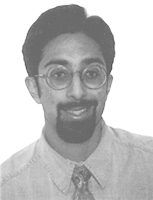Jade Vinson to Receive Morgan Prize
April 14, 1998

A native of Savannah, Georgia, Jade Vinson inherited his love of mathematics from his father, an auditor, and his mother, a high school mathematics teacher. Vinson began studying mathematics at Savannah's Armstrong State University while he was still in high school; in fact, he skipped his senior year and began his undergraduate studies at Washington University, where he surveyed the applications of mathematics to physics, economics, and electrical engineering. During his collegiate career, he organized many mathematics colloquia for undergraduate and high school students, served as a member of both the Mathematical Contest in Modeling and Putnam teams, and spent summers participating in research programs at Cornell University and the National Security Agency.
According to the Morgan Prize Committee, Vinson conducted "wide-ranging research in analysis and geometry" during his undergraduate studies. His work, which included the study of fractals, sphere packing, and other areas of computational convexity theory, answered difficult mathematical questions "at a high level of sophistication," according to the prize citation. As an undergraduate at WU, Vinson was a member of the university's award-winning team in the 1997 Mathematical Contest in Modeling, was an active participant in the Research Experiences for Undergraduates program at Cornell University in 1996, and spent the summers of 1995 and 1997 working on mathematical problems at the National Security Agency. In addition, he has made presentations at eight mathematics conferences and colloquia, and has authored or co-authored nine articles that have appeared in or been submitted to journals in the field.
For Vinson, his computing skills---especially his willingness to learn computer programming---have served as invaluable aids to his mathematical research. "I think that computers create an opportunity for undergraduates to collaborate successfully with mathematics professors," says Vinson. "Math professors who did not grow up using computers often have ideas that they are unable to test because of the complexity of the calculations involved.
"Enlisting the help of an undergraduate to implement [a professor's] idea on a computer can not only test the original idea, but it can also draw the student into the research, with the hope, of course, that the student would eventually begin to contribute his or her own ideas," he continues.
The Morgan Prize Committee also awarded Honorable Mention to Vikaas Sohal, who graduated from Harvard University in 1997. Sohal was cited for his use of mathematical methods to study biological processes within the hippocampus and the cortex; according to the prize citation, he used model building and simulation to investigate the role of two neuromodulators in the formation of new memories, episodic memory functions, and spatial navigation. Sohal is currently a Henry Fellow, studying applied mathematics, at the University of Cambridge. He will enter the joint MD/PhD Program at Stanford University in the fall of 1998.

Vikaas Sohal, who was born in Houston, Texas, and grew up in Idaho Falls, Idaho, developed his interest in mathematical problem solving after participating in Mathcounts in junior high school and then studying nonlinear dynamics in high school as part of a University of Texas Young Scholars' Program. He became interested in neuroscience while he was studying applied mathematics at Harvard University, where he investigated mathematical models of learning and memory with Michael Hasselmo, who nominated him for the Morgan Prize.
The Morgan Prize is co-sponsored by the American Mathematical Society, the Mathematical Association of America, and SIAM; the three organizations rotate the annual awarding of the prize, which was first presented in 1995 to Kannan Soundararajan, a graduate of the University of Michigan. Kiran Kedlaya, a graduate of Harvard University, received Honorable Mention in 1995. The 1996 Morgan Prize was awarded to Manjul Bhargava, a graduate of Harvard University. Lenhard L. Ng, another Harvard graduate, received Honorable Mention for his 1996 work.
The prize is entirely endowed by a gift from Mrs. Frank (Brennie) Morgan. Any student who is an undergraduate in a college or university in Canada, Mexico, or the U.S. or its possessions is eligible to be considered for this prize. The prize committee can award no more than one prize, as well as a few Honorable Mentions, annually.
The prize was designed to recognize different aspects of research by undergraduates. The single prize of $1000 highlights excellence in research, the provision for a few Honorable Mentions recognizes the keenness of the competition, and the possibility that the prize could be awarded to a group of students working together acknowledges the important role that collaboration often plays in mathematical research. "My mom and I are proud of every participant--student or nominator," says Williams College mathematics professor Frank Morgan, a member of the awards committee and the son of Frank and Brennie Morgan, for whom the prize is named. "If you've done some creative mathematics, it's easy to apply," adds Morgan, who is currently a visiting professor in the Department of Mathematics at Princeton University. The deadline for submissions of nominations for the 1998 award, which will be presented by AMS at the joint AMS-MAA meeting in 1999, is June 30, 1998.

